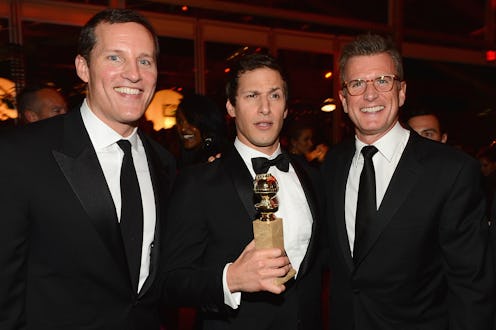Entertainment
Fox Might Have Just Changed TV Forever
Every once in a while a bunch of television critics gather into cramped rooms together and listen to TV executives and stars talk about what's coming next for their shows and for the industry. This can lead to some pretty memorable moments, like last week when that reporter questioned why Lena Dunham dare be naked so often. Today, though, Fox head Kevin Reilly announced the end of pilot season — at least for Fox.
Reilly, Chairman of Entertainment for Fox, opened his TCA panel with the announcement that Fox would be foregoing pilot season for the foreseeable future — and he had a graphic and everything!
Reilly's been vocal in the past about what he referred to as the "welfare state" of the pilot season, which is the term used to refer to that stretch roughly between January and April, in which networks cast/produce/test hundreds of new pilots in the process of deciding which few they'll greenlight to be series.
Here's what he said in an interview with The Hollywood Reporter this past October:
I don't like the welfare state of the development process. A lot of this town was sustained by the pilot system, where we were making an enormous and inefficient amount of product. It never made a lot of sense, but frankly, it wasn't bad for people because they may not have a series, but in the meantime they're paying their bills with the pilot. It's a silly system, so maybe one of the healthier things that could evolve as there are more series opportunities is to get off of that inefficiency of just throwing spaghetti at the wall. But it's very difficult to unwire the town. Even agents are still in this mode of "pilot season." What the hell is pilot season? It's an artificial boundary that makes no sense, and it makes you do things under duress.
And again in an interview with Vulture, discussing how a new model will likely save networks millions:
Is [going straight to series] possibly going to be any worse than what we're doing now? I don't think so. In the long term, it's actually going to be more efficient.
During his panel Monday, in which he made the official announcement, Reilly sited pilot season's built-in time restrictions as unnecessary pressure on the creative process, saying that "it's nothing short of a miracle that the talent is able to produce anything of quality in that time period." He believes allowing more breathing room by focusing more on individual shows will allow everyone involved to devote their time and energy into elevating pilots from good to great.
Here's an example: A show shoots a pilot that is moderate, and promising, but not great (think 30 Rock's pilot, which Tina Fey was not satisfied with). Under the old system, chaotic scheduling would often mean no time to fix whatever was failing the first time around. Reilly seems optimistic that operating outside of the constraints of the pilot system model would mean more time to reshoot that hypothetical pilot: Tweak the lines with the clunky exposition, recast that guy who really does not fit that character, move the pace forward a little more effectively.
According to Reilly, cable's proven that audiences don't care about the classic models of fall/midseason/etc.; they care about the product.
The whole thing is also yet another reflection of the various ways in which Netflix really is changing the television industry: Netflix's model of releasing an entire season at once for the consumer to decide on is markedly different from the "make a hundred pilots and air three of them" approach that's been ruling network television for decades. As Reilly noted in his presentation, the latter model was built by the three-network system of yesteryear, and it might just finally be time to move on from it.
It's a statement glaringly obvious to anyone who's been paying even tangential attention: Network television is changing. If they're not changing, they're but a few short steps from going extinct. This isn't the first time nixing the pilot season has been tried — but television is not in the same place it was even five years ago. There's always a possibility that this could all crash and burn. There's also the chance, though, that Reilly's move is one that will champion the creative process, and hopefully bring us a revised, more workable system — and some damn awesome new shows.
Image: Getty Images
